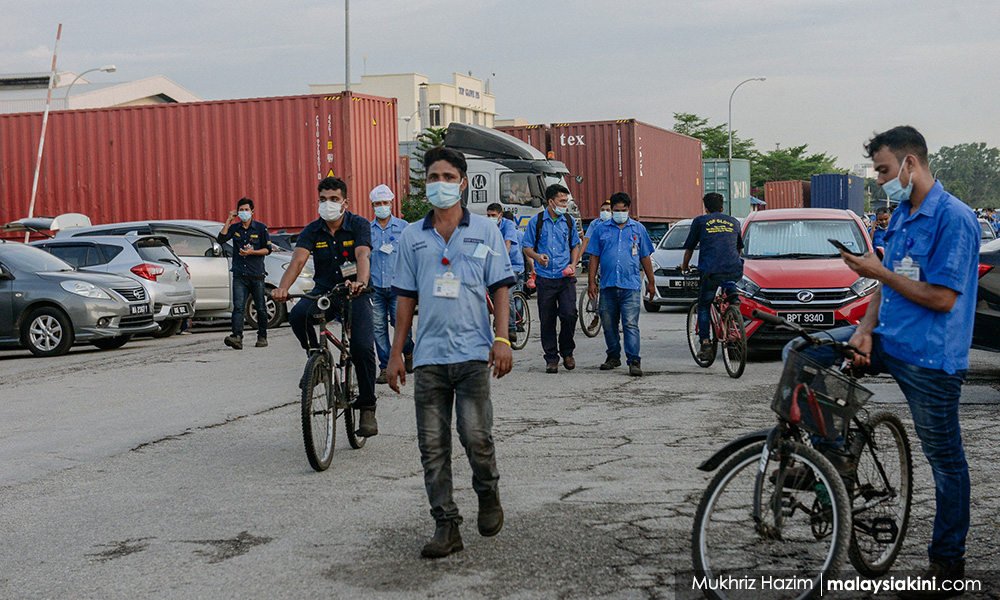ADUN SPEAKS | I am fully sympathetic to the Malaysian Federation of Employers (MEF) as to the labour needs of employers in the manufacturing, service, plantation and agricultural sectors.
MEF’s president Syed Hussain Syed Husman has pleaded with the government to allow employers to hire foreign workers.
Since the economy is gaining traction, especially under conditions of the post-Covid-19 pandemic, opportunity must not be lost in opening employment opportunities for employers.
If employers are not given the chance to hire foreign workers, then the losses sustained during the pandemic cannot be addressed.
As it is, there are more than 1.3 million documented workers, of course, not to speak about a large number of undocumented ones.
It is not that employers don’t prefer local workers, but there is a problem on the supply side. Moreover, employing foreign workers costs much higher than hiring locals.
Under the conditions of the pandemic and with the ready availability of foreign workers, it makes for MEF to argue in favour of foreign workers.
But the perennial question confronting us without sounding xenophobic is when are we going to adopt a systematic approach to reduce the presence of foreign workers.

The MEF despite it being the champion of employers seems more concerned with short term measures to address workers shortage.
Given this pressing need, local workers are dismissed as not being interested or disinterested in certain types of employment.
Even if employing foreign workers might be expensive in the short run, but in the long haul, they are a lot cheaper than local workers.
Let us not forget, by and large, foreign workers given their pliant nature are more amenable to wage manipulation or low wages.
There is a reason why employers in some sectors prefer foreign labour to local ones due to placement of lid on wage increase.
There is no other intrinsic interest as to why employers prefer foreign workers.
The government of the day caught in between the pressing demands might not be in a position to think and act in the direction of reducing foreign workers.
Throughout the history of this country, the needs of employers and their agencies have taken priority over the needs and welfare of the working class.
Debates about reducing the number of foreign workers are merely academic in nature. To date, nothing concrete has resulted in terms of reducing foreign workers.
Alternatively, the recovery from the pandemic is being used to justify the intake of foreign workers.
But unfortunately, foreign workers are still in the country waiting to be employed, not necessarily repatriated.
As more and more industries are being allowed to commence operations, the question of a labour shortage is looming high on the horizon.
In the absence of long term manpower planning either on the part of the government or the private sector, the ready availability of foreign labour provides a convenient excuse for its employment.
Recalibrated or not, it is a question of time before foreign workers come to be fully employed.
MEF is fully aware of the pandemic's impact and how employers in almost all sectors experienced hardship, loss of employment and the resulting loss of billions of ringgit.
It is unfortunate that the MEF has not really changed its tune on foreign workers before and after the impact of the pandemic.

Under the conditions of stark labour shortage, there is little or no time to debate about whether we need or have to reduce our reliance on foreign workers.
While the MEF wants the government to relax the entry of foreign workers for employment, it has hardly said anything about local workers who were laid off especially those in the lower socio-economic category.
Why can’t MEF, rather than constantly harp on the tragic situation of employers, take some time off to think seriously of local workers, their skill levels and why companies prefer not to recruit them in comparison to the foreign workers?
It is obvious that the MEF has done little thinking as to why the large presence of foreign workers might not be good for capital deepening and technological development.
There is an integral relationship between the skills of workers and the value they create in sustaining and deepening the production process.
Such skills are with local workers and not necessarily with foreign workers.
This is why it is essential that both the government and the industries must pay serious attention to the creation of value in the production process. Such value cannot be created by the over-reliance on the foreign workforce.
But unfortunately, capital deepening through the creation of value by local workers as opposed to foreigners have been lost to MEF or for that matter, the government of the day.
Pandemic or not, there is no necessity for MEF or employers to talk about increasing the intake of foreign workers.
There is no better time than now for employers, the government and unions to think of ways and means to reduce the employment of foreign workers.
By the way, plantation companies need cheap and pliant workers simply because the derivation of profit is tied with the ability to squeeze their wages.
Yet the MEF uncritically defends the plantation companies for their losses suffered under the pandemic, but there is little concern expressed in understanding the plight of the oppressed workers.
P RAMASAMY is Perai assemblyperson and Penang deputy chief minister II.
The views expressed here are those of the author/contributor and do not necessarily represent the views of Malaysiakini.

